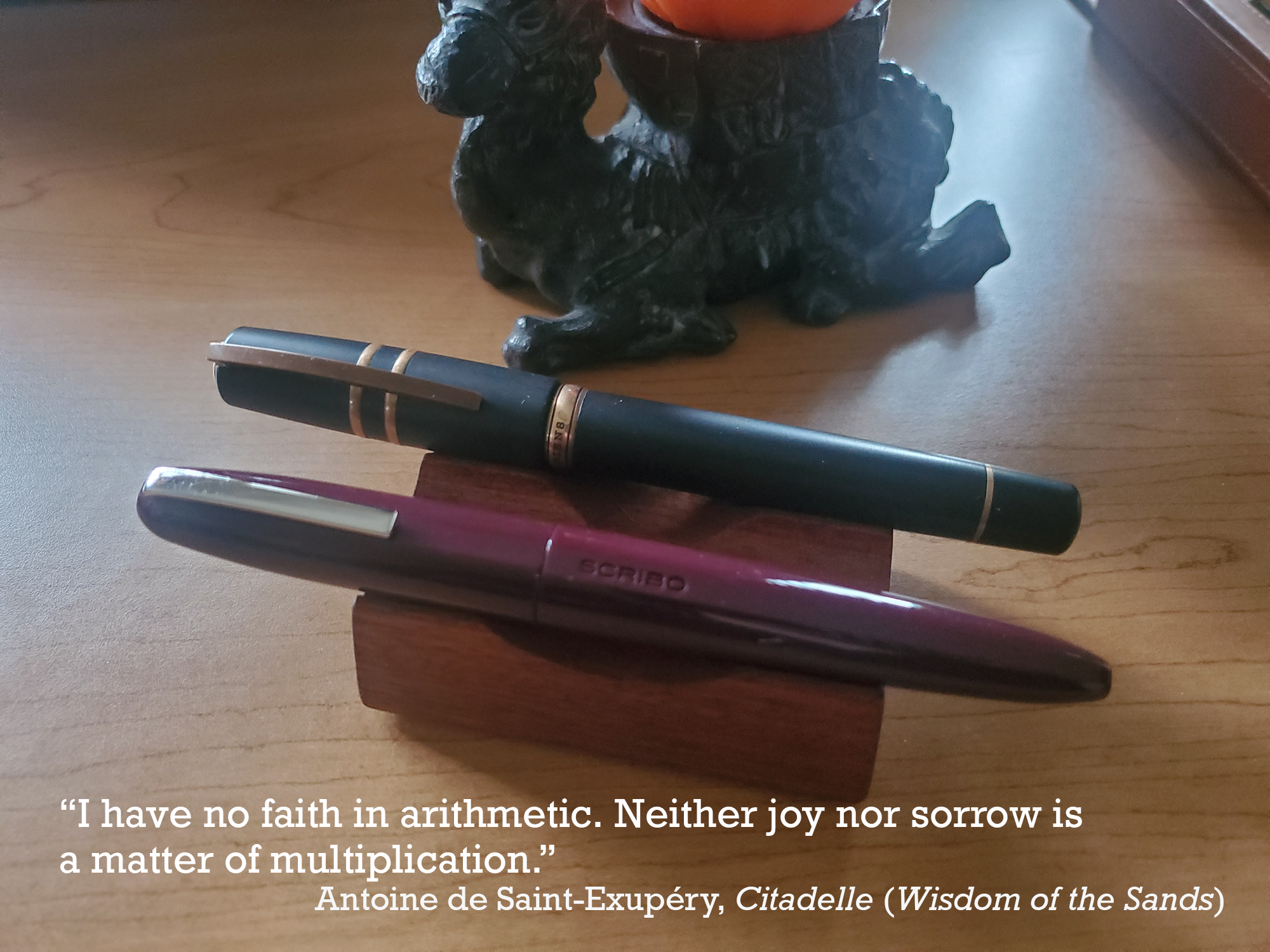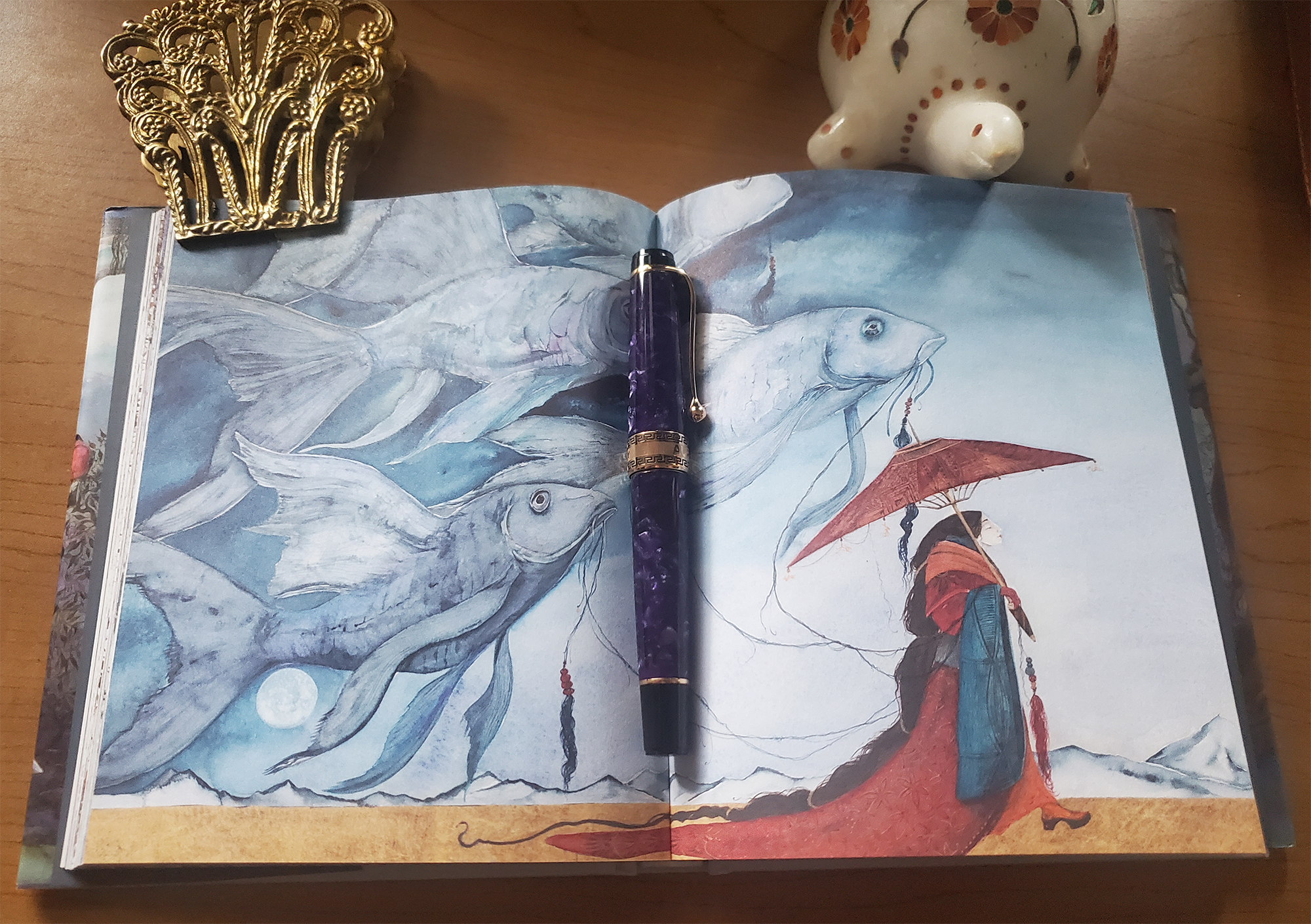On minimalism
Words can mean different things to different people. For some fountain pen people, “minimalism” means a single pen and a single ink. For others, “minimalism” is ten pens, for others twenty pens, but not a single one above that number. Another person may feel they are a minimalist because they can easily see themselves downsizing to ten pens, they just haven’t done it yet. Minimalism can have many other meanings.
Sometimes these judgments are about the psychology of sensory input. Black and silver colored pens may feel minimalist in a way the same pen model in yellow and gold will not. A mostly cool-tone and monochrome collection can feel more minimalist than the same number of pens in a rainbow of colors.
The burgundy Scribo Piuma may be the closest to minimalist aesthetic in my gathering right now. That said, I do wonder if an Italian pen can ever be truly accepted in the hallowed halls of minimalism, even if the pen itself is minimalist in design :)
For well over a decade, I owned just one pen, the Namiki Falcon, and that did not feel minimalist at all. It felt outright indulgent to own a fountain pen at all, and I did not even buy it - it was a gift from my family. To own more than one fountain pen was unfathomable. (When I got the pen I was very poor, and an international graduate student.)
Those days I fluctuate between 15-20 pens. I’m older, have stable income and a nose for sales. My collection absolutely does not feel minimalist to me, but 15-20 pens could feel that way to someone downsizing from a hundred.
The idea of minimalism has become attractive to many people because it comes bundled with values which are often admired. Values such as restraint, thoughtfulness, ecological consciousness, frugality, and being able to be content with a single object rather than constantly pursuing more. But I don’t think there is an inherent moral value in minimalism (or maximalism) - those are discourses.
Minimalism as a consumer ethic became a kind of aspirational/moral goal in the early 21st century - we are constantly bombarded with media about decluttering, streamlining, organizing, getting rid of, simplifying. The maximalism trend of recent years pushes back against this. “Cluttercore” is just one relatively recent trend/ aesthetic which emphasizes sensory variety, coziness, and the delight of having versus not having. These are also discourses.
No matter how few items you own, you probably won’t be considered a minimalist if your stuff is decorated. (the book is The Unwinding by Jackie Morris; the fountain pen is my beloved Aurora Optima Viola with a factory stub, inked with Montblanc Jimi Hendrix.
I have an avid interest in minimalism as a person who spent most of my childhood, adolescence and early adulthood in poverty. I’ve been an immigrant twice and moved between continents with a small bag - not because I was a minimalist, but because I didn’t have anything. I like the idea that I can survive and make my way in the world while owning next to nothing. But I am very far from embracing this as an aesthetic.
I describe my aesthetic in words such as textured, detailed, unique, sensory, evocative, elaborate, lyrical, thoughtful, artisanal, and leaning towards autumn and winter palettes. None of this relates in any way to the number of things I own.
I am not a minimalist, but I am also not a maximalist. I need space, and a relatively uncluttered desktop. I want to enjoy the beautiful things I’ve curated, but I don’t want to be overwhelmed by them. If we have to use these labels, then I am somewhere in the middle of the minimalist to maximalist continuum, but leaning maximalist. That’s just me - there is no judgment here of anybody else.
I also dislike these labels - I feel they obscure more descriptive and thoughtful explorations of why we love what we love.
My work desktop is uncluttered. I had to squish things together to take this picture. The art glass pumpkin thoroughly disqualifies this tableau from being minimalist :)
Sometimes I wonder what minimalism would mean in terms of creative output and publication. In my writing journey so far, I published multiple essays, articles, poems, stories and even books. Would it be more minimalist, more elegant even, to publish just one or two big, hard-hitting books? Probably. But that’s not how my brain works.
I don’t see minimalism as a virtue. Maximalism is also not a virtue. I think our stationery choices are value neutral in the grand scheme of things. But our stationery habit can tell stories about us - about our identity, history, aspirations, character traits, joys and worries, and even neurotype. It is worth figuring out, I think, what our style of collecting and using stationery means for each of us, and also what it it reveals.



